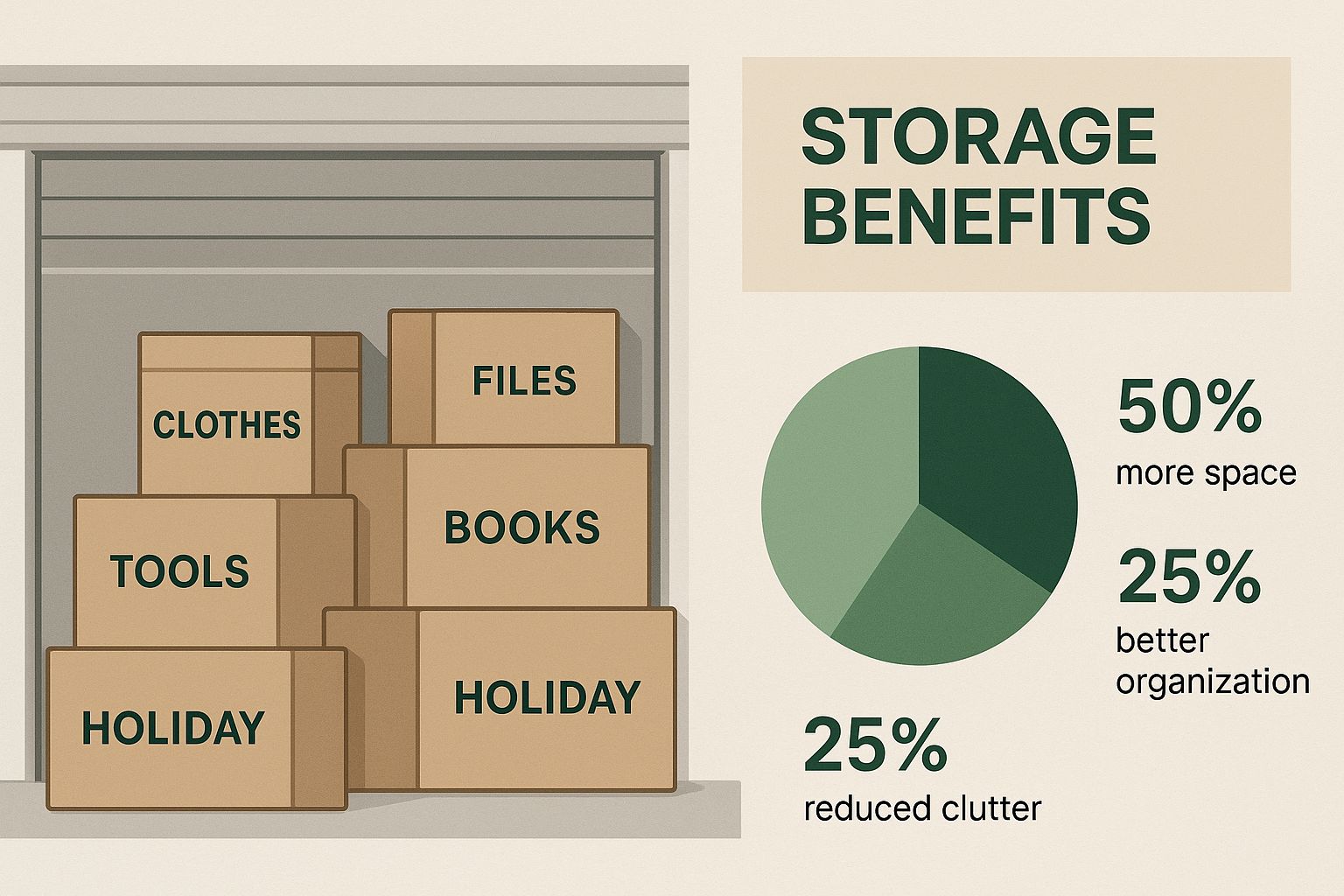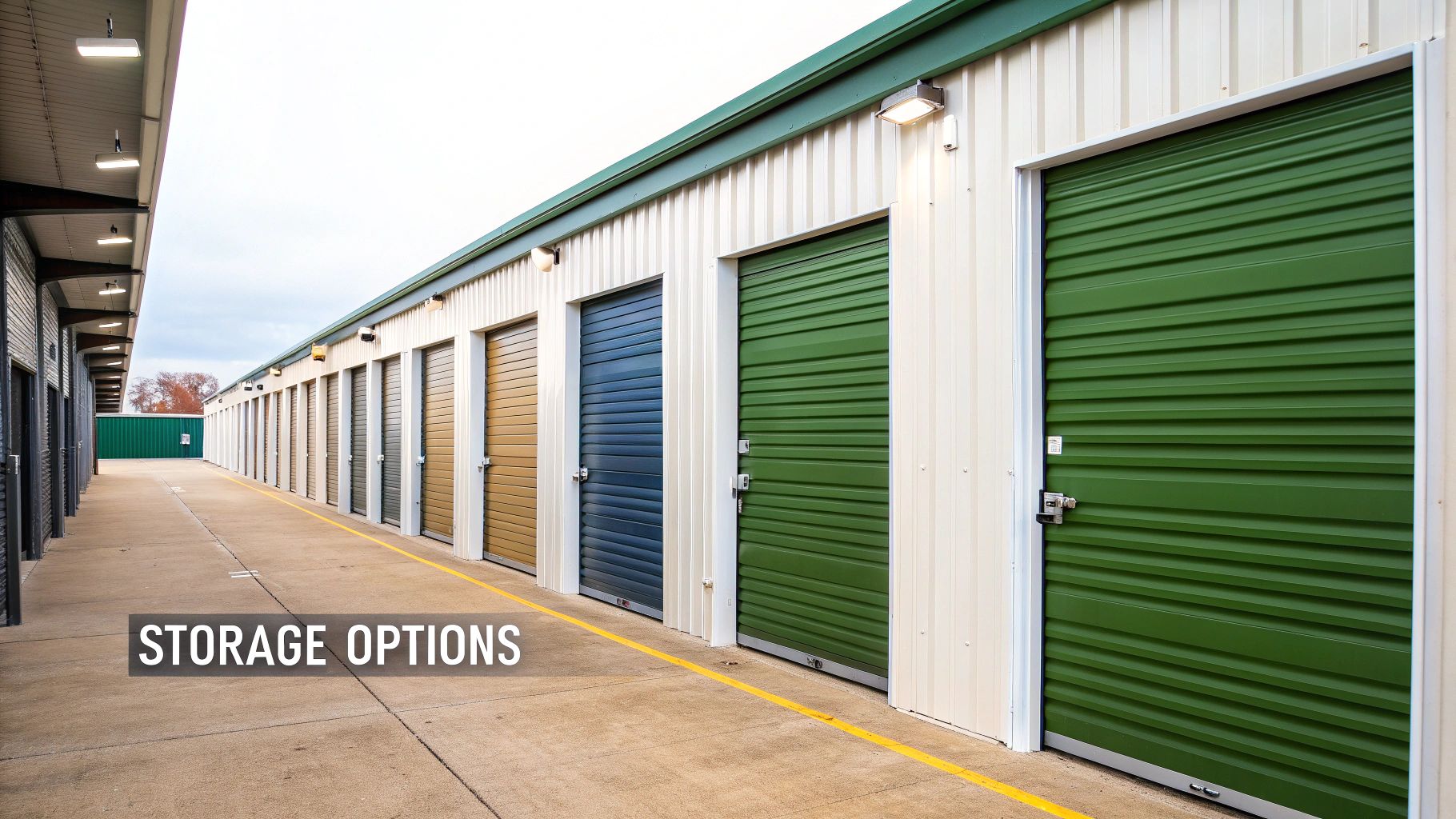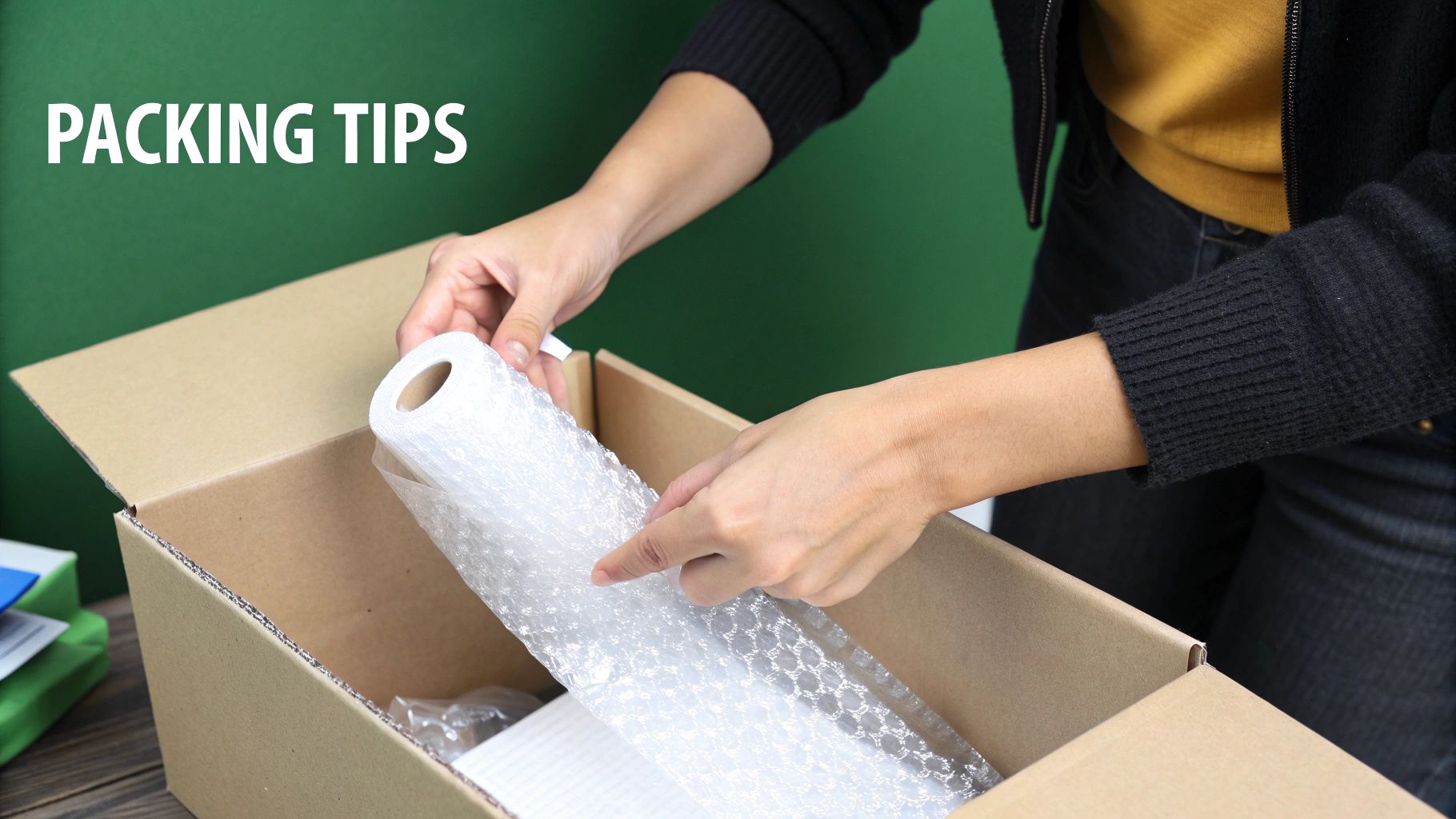Find Temporary Storage Near Me: A UK Guide
So, you’re searching for "temporary storage near me." That usually means life’s in a bit of a shuffle. Maybe you're moving house, finally tackling that decluttering project, or need a spot to keep business stock. Whatever the reason, finding the right local storage is crucial for a stress-free transition. It’s about more than just finding the closest place; you need to find the right fit for what you're storing.
Starting Your Search for Local Storage
First things first, let's figure out exactly what you need. The right storage solution really depends on your situation. A family moving house has a completely different set of requirements compared to a student who just needs to store a few boxes over the summer.
Before you even open a browser tab, take a minute to think it through. What are you storing, and for how long? If you’ve got delicate items like electronics, antique wooden furniture, or important documents, an indoor unit is your best bet. It’ll shield them from the UK's famously unpredictable weather.
On the other hand, if you're storing bulky garden tools, big furniture, or business equipment, an outdoor container is a solid, easy-to-access choice. If you want to get a better idea of all the options out there, it's worth looking into comprehensive storage solutions to see what's available.
Key Factors to Prioritise
Once you know what you’re storing, you can start narrowing down the search. A few key details will help you filter out the places that just won't work and zero in on a facility that gives you convenience and peace of mind.
- Location and Access: How close do you need it to be? Think about how often you'll be popping in. A unit near your home or work will save you time and petrol. Also, don't forget to check the access hours. Some facilities offer 24/7 access, which is a game-changer for business owners or anyone with a hectic schedule.
- Security Measures: This is non-negotiable. You need to know your things are safe. Look for facilities with proper security like CCTV, a secure perimeter fence, and electronic gate access. Having staff on-site during business hours is another huge plus.
Your belongings are important, so never compromise on security. A well-lit, clean, and professionally managed site is often a clear indicator of a facility's commitment to keeping your items safe.
Getting these basics sorted from the start will give you the confidence to move forward and choose a temporary storage solution that actually works for you and your budget.
How To Choose The Right Storage Unit Size
Figuring out what size storage unit you need can feel like a guessing game. Get it wrong, and you’re either paying for empty space or frantically trying to cram everything in when you’re halfway through moving. The trick is to stop thinking in abstract square feet and start visualising how your items will actually fit.
It's often surprising how much you can fit into a seemingly small space with a bit of planning. For instance, the entire contents of a typical one or two-bedroom flat—sofas, beds, kitchen appliances, the lot—can often fit neatly into an 80 sq ft unit, which is about the size of a large garden shed. On the other hand, a local tradesperson might only need a 35-40 sq ft unit for their tools and materials, but they'll be more concerned about ground-floor access for heavy gear.

As you can see, a little organisation goes a long way. Labelling your boxes and stacking them smartly isn't just about being tidy; it protects your belongings and makes it so much easier to find what you need later on.
Matching The Unit Type To Your Belongings
It’s not just about size—the type of unit you choose is just as critical. This decision should hinge on what you’re storing, not just how much of it you have.
- Indoor Units: These are your best bet for anything sensitive. Think electronics, important business documents, wooden furniture, or anything that doesn't react well to damp. Many indoor facilities are climate-controlled, keeping temperature and humidity stable, which is a lifesaver for valuable items.
- Outdoor Containers: If you're storing more robust gear like garden machinery, building supplies, or large, well-wrapped furniture, outdoor containers are a brilliant, cost-effective solution. They offer drive-up access, which makes loading and unloading heavy items a breeze.
Don’t just book the cheapest option you find. Taking a moment to consider whether your valuables need protection from temperature swings can save you from costly damage down the line. It's a small detail that makes a huge difference.
Quick Storage Unit Size Estimator
To help you get a better idea, here's a simple table to match common household sizes with typical storage units.
| Unit Size (sq ft) | Roughly Equivalent To | What It Typically Holds |
|---|---|---|
| 35 sq ft | Large walk-in wardrobe | Boxes, small furniture, seasonal items, or business stock. |
| 80 sq ft | Large garden shed | Contents of a 1-2 bedroom flat, including larger appliances. |
| 160 sq ft | Single car garage | Contents of a 3-bedroom house, including furniture and boxes. |
This is just a starting point, of course. The best way to be certain is to make a quick inventory of your larger items.
If you’re still unsure, our complete guide on what size storage unit you might need offers a more detailed breakdown to help you choose with confidence. A few minutes of planning now will ensure you get a solution that's both efficient and economical.
Understanding Storage Costs and Pricing
Trying to pin down storage costs when you're searching for "temporary storage near me" can sometimes feel like you're trying to hit a moving target. Prices aren't always cut and dried, but getting to grips with what influences them puts you firmly in control. The final monthly rate you'll pay is a blend of a few key elements.
Unsurprisingly, the unit's size is the biggest driver of cost—a spacious 160 sq ft unit will naturally be more than a compact 35 sq ft one. But the facility's location plays a huge part, too. A storage centre in a prime city spot will almost always have higher rates than one further out, simply due to land costs and what people in the area are willing to pay.

What to Look Out for on Your Quote
Once you move past the basic rental fee, there are other potential costs and valuable extras to think about. Knowing what these are helps you properly compare different places and saves you from any nasty surprises down the line.
- Introductory Offers: Lots of facilities will tempt you with deals like "50% off for the first 8 weeks." These are brilliant for short-term storage, but always ask what the standard monthly rate is afterwards so you can budget properly.
- Contract Length: Some places might offer a small discount if you commit to a longer rental period. This can be a smart move if you know for sure you’ll need the space for several months.
- Premium Features: Expect to pay a little extra for things like 24/7 access or climate-controlled units. These features add a lot of convenience and extra protection for your belongings, so it's often worth it.
It's so important to look beyond just the headline price. Before you sign anything, make sure you ask about any other costs, like a one-off admin fee, the price of a high-security padlock, or if insurance is compulsory.
Budgeting for the Full Cost
To get a truly accurate budget, always ask for a full breakdown of every possible charge. A good, reputable company will be completely transparent about their fees and happy to walk you through them.
For a clear idea of what to expect, you can have a look at our straightforward self storage pricing structure to see how everything is laid out with no hidden extras. A bit of prep work now ensures you find a quality solution that genuinely fits your budget, without any hidden costs popping up later on.
Essential Security Features to Look For
When you leave your possessions in storage, you're not just renting space; you're buying peace of mind. Knowing your belongings are properly protected is non-negotiable, so it’s vital to assess the security measures of any facility you’re considering. Whether you're doing an in-person visit or researching online, there are specific features that separate a basic setup from a truly secure one.
The first line of defence is often the perimeter. Look for high, well-maintained fencing that clearly marks the site's boundary. For outdoor needs beyond a standard unit, you might explore durable temporary fencing solutions to understand what robust security looks like. This should be paired with a modern access system, like a coded electronic gate, which ensures only authorised customers can enter the premises.
Layers of Protection
Beyond the main gate, look for multiple layers of security that work together. Proper security isn't about a single feature, but how several elements combine to create a safe environment.
Here are the key things I always check for:
- 24/7 CCTV Surveillance: Cameras should cover all main access points, driveways, and corridors. It's worth asking if the footage is actively monitored and how long it's stored.
- Individual Unit Alarms: While not standard everywhere, individually alarmed units offer a fantastic extra layer of protection, alerting staff immediately if there's any unauthorised access.
- Good Lighting: A well-lit facility is a major deterrent to potential thieves. Pay close attention to this, especially if you think you'll need to access your unit after dark.
Peace of mind comes from knowing a facility takes security seriously. The presence of on-site staff during business hours provides an invaluable human element, adding a level of oversight that technology alone cannot replicate.
The UK self storage market is booming, with a 7.2% increase in floorspace last year, bringing the national capacity to a massive 64.3 million square feet. As the industry grows, so does the variation in quality and security standards. Taking the time to verify these security details ensures your chosen "temporary storage near me" is up to the job. Remember, a well-organised unit is easier to secure, and our guide on how to pack your storage unit can help you get started.
How to Book Your Storage Unit Online
Gone are the days of endless phone calls and multiple site visits just to find a decent storage unit. Thankfully, booking temporary storage is now something you can do from your sofa, often in just a few minutes.
This move to online booking is a massive win for anyone needing space. Most leading providers have straightforward websites that walk you through everything. You can browse available units, see the actual prices, and pick a move-in date that works for you, all on your phone or computer.
The Simple Steps to Secure Your Space
The whole online booking process is designed to be painless. It usually starts with picking the unit size you need, then you'll fill in your details and have a look over the rental agreement. Once that's sorted, you can sign the paperwork digitally and make a secure payment online to lock in your spot.
It puts you completely in control. All the information you need is right there, so you can manage everything on your own time. To see just how easy it can be, you can walk through the steps and book your storage unit online with us right now.
The modern self storage industry has really embraced technology. It’s not just about making things convenient; it's about offering a secure, efficient, and transparent service that people actually expect these days.
The UK self storage market is a great example of this. With the industry's turnover hitting nearly £1.2 billion, it's no surprise that a huge 90% of stores now let you book online. This widespread adoption just shows how focused the sector is on making life easier for customers. You can find more insights on this trend and the UK self storage market on clevelandcontainers.co.uk.
Common Questions About Temporary Storage
Even after you've found a few promising options for temporary storage, it's natural to have a few questions lingering in the back of your mind. Getting clear answers now helps you make the final call with confidence, so there are no surprises down the line.

Let's run through some of the most common queries we get from customers, from the nitty-gritty of insurance to what you definitely can't pack away.
Do I Need Specialised Insurance For My Stored Items?
Yes, almost certainly. Any reputable UK storage facility will require you to have insurance. It’s a mandatory part of the rental agreement, making sure your goods are properly protected.
Often, the simplest route is to take out a specialised policy offered directly by the storage provider. Some people try to extend their existing home contents insurance, but you have to be careful here. It's crucial to confirm this directly with your insurer, as many standard policies won't cover items stored off-site. Never just assume you're covered.
What Items Are Restricted From Storage?
Every facility has a strict list of prohibited items for safety, legal, and hygiene reasons. While the specifics might vary slightly from place to place, the core restrictions are pretty much universal across the UK.
As a general rule, you cannot store:
- Flammable or explosive materials – think petrol, gas canisters, or fireworks.
- Perishable goods like fresh food that will rot and attract pests.
- Illegal substances, firearms, or other weapons.
- Live animals or plants.
- Hazardous or toxic materials, including things like chemicals and asbestos.
Always double-check the facility's specific list of restricted items before you pack a single box. Storing something you shouldn’t can lead to your rental agreement being terminated immediately, not to mention potential legal trouble.
The UK self storage industry is growing fast, with forecasts projecting steady growth at a Compound Annual Growth Rate (CAGR) of 5.91% over the next decade. Interestingly, despite this boom, some surveys show that up to 37% of people aren't familiar with how it all works. You can learn more about UK self storage trends at storeganise.com.
How Much Notice Do I Need To Vacate My Unit?
This is a key detail to check in your rental agreement. Typically, you'll need to give somewhere between 7 and 14 days' notice before you plan to move everything out for good.
Knowing the notice period before you sign on the dotted line is a smart move. It helps you avoid paying for an extra week or month that you don't actually need. Giving notice is usually straightforward—often just a quick phone call or an online form is all it takes.
Ready to secure your space? With MG Self Storage, you get a clean, secure, and flexible solution for your temporary storage needs. Find the perfect unit and book online in minutes.
Visit us at https://mgselfstorageexeter.co.uk to get started today.




